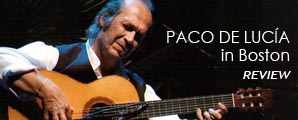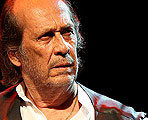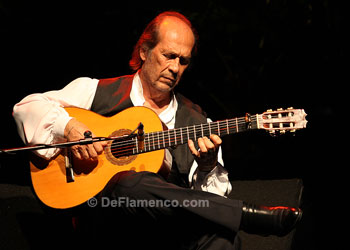Brook Zern
What Hath God Wrought?
 The Paco de Lucia Septet
|
|
Paco de Lucía and his Seven Sidemen appeared at the Boston Opera House on April 11 – a well-oiled machine rolling through the U.S. after a long absence. (One reason for that long absence is revealed in an interview that appeared on the same day as the concert. Paco says that aside from the distance, “the situation in the U.S. is very ugly these days, and everything is very complicated with the visas and the controls; they treat you like a suspect, when in fact you are innocent until proven guilty.” His view was promptly confirmed by a front-page New York Times article about the that same problem, noting the failure of the U.S. to grant a timely visa to the flamenco/soul fusioneer Pitingo, whose New York concert was cancelled.) For Paco, Boston isn’t just another stop along the way. It was there that Paco was granted an Honoris Causa degree by the prestigious Berklee College of Music, and where the producer Javier Limón has been working with various flamenco artists to explore new paths of fusion, and planning programs for the new Berklee campus in Valencia, Spain. “The most advanced guitarist in any idiom” – Guitar Review The concert drew upon the whole history and evolution of Paco’s later career. It is loosely keyed to his new recording, ENVIVO, featuring performances from his 2010 tour of Spain. There was no program, but the informative and well-written liner notes from the CD outlined Paco’s career and musical evolution. In the lobby, a huge poster of the now-grizzled Paco seemed to oversee the proceedings. Above his head were the words, “The most advanced guitarist in any idiom” – Guitar Review. (I was that magazine’s flamenco editor for decades, and wrote those words in the mid-seventies.)
As usual, the concert began with a guitar solo – a ravishing rondeña that quotes from preceding versions but is fresh and inventive, beginning with no fixed rhythmic abode and ending with strong, steady pulse and punch. And, as usual, the flamenco guitar concert ended there. Paco was immediately joined by other wildly talented members of his group, deliberately subsuming his incomparable guitaristic genius to his broader vision of instrumental flamenco as an ensemble music in the spirit of a typical jazz group. Recognizable flamenco, with only occasional flights toward the more abstract realm of loosely structured jazz. Within that context, the concert was a resounding success. And compared to some Paco events, the music leaned toward recognizable flamenco, with only occasional flights toward the more abstract realm of loosely structured jazz. The interplay was intense, and the mutual admiration of the artists was a pleasure to behold. As might have been expected in the U.S. and nearly everywhere else, the dancer almost stole the show. And perhaps any competent dancer might have elicited those all-American whoops, yelps, yee-has and shouts. Fortunately, the dancer was Farruco, grandson and namesake of the greatest male dancer I have ever seen, and he managed to project the singular brilliance of that family tradition. Duquende sang well, and seems to have found a path that distinguishes him from the “Camarclones”, if that’s the right word for the slavish imitators of Paco’s singing idol and creative coequal, the great Camarón de la Isla. David de Jacoba is clearly talented as well. I assume that Piraña’s percussion was top-notch, and I was nonplussed to note that the harmonicazations of Antonio Serrano seemed to project actual flamenco feeling. (It certainly seemed more appropriate than the allegedly flamenco flute, an ill wind that nobody blows good because it lacks the gritty overtones that fit the flamenco aesthetic.) Paco himself remains a wonder of nature, even if I have seen him on better nights in the nearly 50 years since he first showed up in New York with the José Greco dance troupe, playing the music of the great Niño Ricardo until he was given that fateful advice by Sabicas – “Do your own thing.” He says that this almost assaultive velocity is a form of internalized rage at the way flamenco and flamenco artists were treated in that desperate era of poverty. (Just think – if he’d been a disciple of Sabicas instead of Ricardo, the old maestro would have said, “Keep it up, kid,” and I would still understand flamenco guitar today.) Paco no longer “runs” – his self-critical term for the way he often played when he was young. He has always played very fast when it mattered. He says that this almost assaultive velocity is a form of internalized rage at the way flamenco and flamenco artists were treated in that desperate era of poverty. Now he is even faster than he was in his youth, though perhaps not in his prime. And yes, there are other incredible players who are standing on the shoulders of this giant, playing even hotter, and sometimes making major statements of their own. But Paco’s genius is undiminished – we are privileged to hear the mature reflections of a lifetime spent far ahead of others. This seemed most evident when his attack on the guitar sometimes generated completely new harmonic soundscapes – angry new overtones or cancellations or interferences that I’d never heard emanate from the instrument before. The concert was a commercial success – it seemed nearly sold out. The audience was delighted, standing and stomping. And it was probably a critical success as well; most reviews of the American tour have been quite good. But the only Boston review I’ve seen – in a publication called ArtsFuse and written by Susan Miron who had never heard of Paco de Lucía – said, “Throughout the evening, the music often felt more like jazz than flamenco.» Ms. Miron may not be an expert, but the music did indeed often feel “more like jazz than flamenco” – even though it was, for Paco, not one of his jazzier productions. And as a jazz musician, Paco de Lucía will never be listed among the immortals, or even the greats. The world’s “most advanced guitarist in any idiom” has become an adequate exponent of the fusion idiom, instead of remaining the world’s greatest exponent of the flamenco guitar idiom. I wish it had been otherwise. I ask again: What hath God wrought? |

